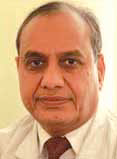
 President of ISCCM, Dr Narendra Rungta,
President of ISCCM, Dr Narendra Rungta,
belives that ISCCM will give a big boost to Critical Care in India and strengthen the human resource need of Critical Care Medicine in our country in coming years. In conversation with Ekta Srivastava, ENN
Critical care involves a lot of technology and therefore is dependent on finances. So do you think there are limitations to the growth of this branch in community hospitals?
Absolutely not! The growth potential is unlimited, finances will have to be raised either by the government or corporate or the community itself because Critical Sickness ultimately is the disease where patients will have to go to ICU and depend on evidenced based modern day medicine. We are running training courses for MBBS doctors, Nurses and will also collaborate with other like minded organisations and universities to create more work forces in country to assist community and district hospitals.

As elected s the President of ISCCM, what new changes and development are you trying to bring?
Decentralisation of administrative process of ISCCM, starting courses and programs which will help the semi urban and rural population of the country, taking Critical Care to places. We have declared war against Tropical Fever Syndrome (Malaria, Dengue, Scrub Typhus, Leptospira etc); we are also trying to take Asian, SAARC and Asia Pacific societies of Critical Care Medicine together. Our focus area will be rural parts of India and areas like Andaman, North East, Chhattisgarh, Rural Rajasthan, Haryana, and Bihar, Jammu and Kashmir where there is very little critical care. We have for the first time started critical care course for nurses. As of this year War against Tropical Fever will be the theme of ISCCM which is celebrated on 9th of October of 2013.
What are the new researches undergoing in ISCCM?
On collection of India Intensive Care unit (ICU) seen status, Tropical fever syndrome, are already on. New guidelines on antibiotics, sedation are being constructed. The new thrust is on research in India, of India and for India in the field of Critical Care Medicine.
How the hospitals can get cost effective medical devices so that the end consumer can benefit?
This is a million dollar question which government and industry has to address. Government should promote research in low cost equipment, remove duties, and subsidies such treatment facility creation. Industry should depend more on volume than huge margins. ISCCM job is to train HR, create standardised guidelines and promote research.

What are the challenges that hospitals face in delivering critical care in India?
Cost, compensation, security to doctors and nurses, massive load during post monsoon, staff shortages, and very poor state security despite laws are the major concerns and challenges. Politicians are happy to be taking populist approach and corporate invasion of medical services. Nursing homes, booming now days but somewhere they will not be able to give all the facilities.
Do you think law should be formed against this?
Its government duty to regulate standard facilities. At the same time regulations should be constructed by professionals at the professional platforms and not in board rooms of corporate to make it difficult for doctors running smaller nursing homes in semi-urban and rural areas who are giving bulk of 90 percent services to population.
Be a part of Elets Collaborative Initiatives. Join Us for Upcoming Events and explore business opportunities. Like us on Facebook , connect with us on LinkedIn and follow us on Twitter , Instagram.












